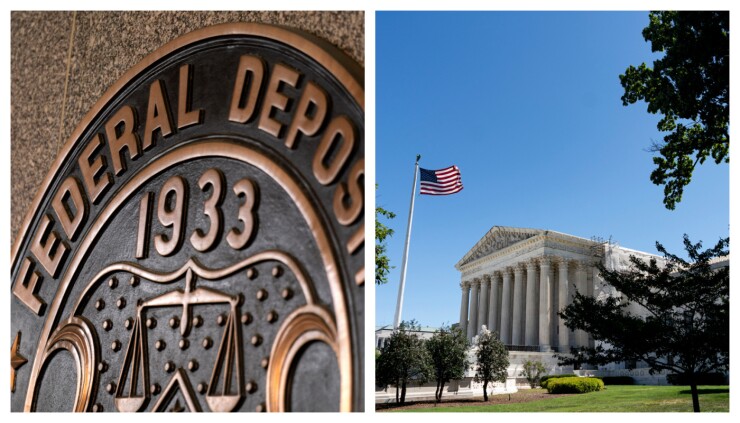
Two months later
In response to the Supreme Court ruling, the Federal Deposit Insurance Corp. (FDIC) recently scaled back its ambitions in a case involving alleged violations of Small Business Administration lending regulations. The FDIC said it would forgo civil penalties but continue to seek damages from the man it accuses of wrongdoing.
But the two sides continue to argue over the implications of the Supreme Court’s landmark decision. And the arguments made on behalf of defendant John C. Ponte offer a taste of the new ammunition banks and bank officials are likely to use in other enforcement proceedings.
“This is definitely a preview of the arguments that banks will make in the future,” says David P. Weber, a former employee of the FDIC (Office of the Comptroller of the Currency) and the U.S. Securities and Exchange Commission (SEC).
One clear result of the Supreme Court’s 6-3 decision in SEC v. Jarkesy is that the banking regulator can no longer ask administrative law judges to hear cases in which the agencies seek civil monetary penalties from a bank or an individual banker. Such proceedings, the court said, violate the defendant’s Seventh Amendment right to a jury trial.
Bankers accused of misconduct often argue that the
Following the Supreme Court’s decision in late June, experts predicted that individuals and companies accused of wrongdoing would test the limits of the ruling – including by trying to determine whether it applies in situations where authorities demand the return or surrender of ill-gotten gains.
That’s exactly what’s happening now in Ponte’s case. He’s trying to stop the FDIC from proceeding with what he calls unconstitutional proceedings – despite the agency’s recent decision to waive its demands for a $74,000 civil penalty.
“Ponte was denied his right to a jury trial under the Seventh Amendment to the U.S. Constitution,” his attorney wrote in a complaint filed in U.S. District Court earlier this month. “Not only does he have no prospect of a jury trial, but the FDIC can proceed with impunity knowing it will not face a jury trial.”
The FDIC fired back on Friday, moving to dismiss Ponte’s lawsuit on the grounds that a jury trial is not required in a case involving restitution.
“The FDIC seeks to compel Ponte to repay SBA loan applicants who were charged fees that violated SBA regulations,” the agency wrote in its court filing. “This award is appropriate and does not require a jury.”
Ponte came under FDIC scrutiny in connection with his work as a contractor for Independence Bank in East Greenwich, Rhode Island. The FDIC alleges that he violated SBA regulations by charging excessive fees to small businesses participating in the SBA’s 7(a) loan program and by taking actions to make applicants appear more creditworthy than they actually were.
“The bank lost over $1.5 million when the loans defaulted on a very frequent basis, the SBA lost nearly $9 million, and borrowers were charged unreasonable fees,” the FDIC argued in its filing.
Ponte has stated that he “strongly denies” the allegations.
It is unclear whether Ponte’s case will resolve the various legal questions raised by the Supreme Court’s decision. Weber, a professor at Salisbury University’s Perdue School of Business, predicted that the FDIC would prevail on Ponte’s constitutional challenge without the judge even addressing those issues.
But Weber also expects further legal challenges to the enforcement actions brought by banking regulators. He noted that Ponte’s lawyer, John Vecchione, works for a nonprofit law firm called the New Civil Liberties Alliance, which specializes in challenging the power of administrative agencies.
Weber also expects banking regulators to ask Congress to make certain changes to their legal authority in response to the Supreme Court’s decision. Until that happens, regulators will likely continue to fight in court over the limits of their authority, he said.
“Their only other choice would be to halt all enforcement actions until Congress passes a solution, and that’s not a particularly ideal solution,” he said.

